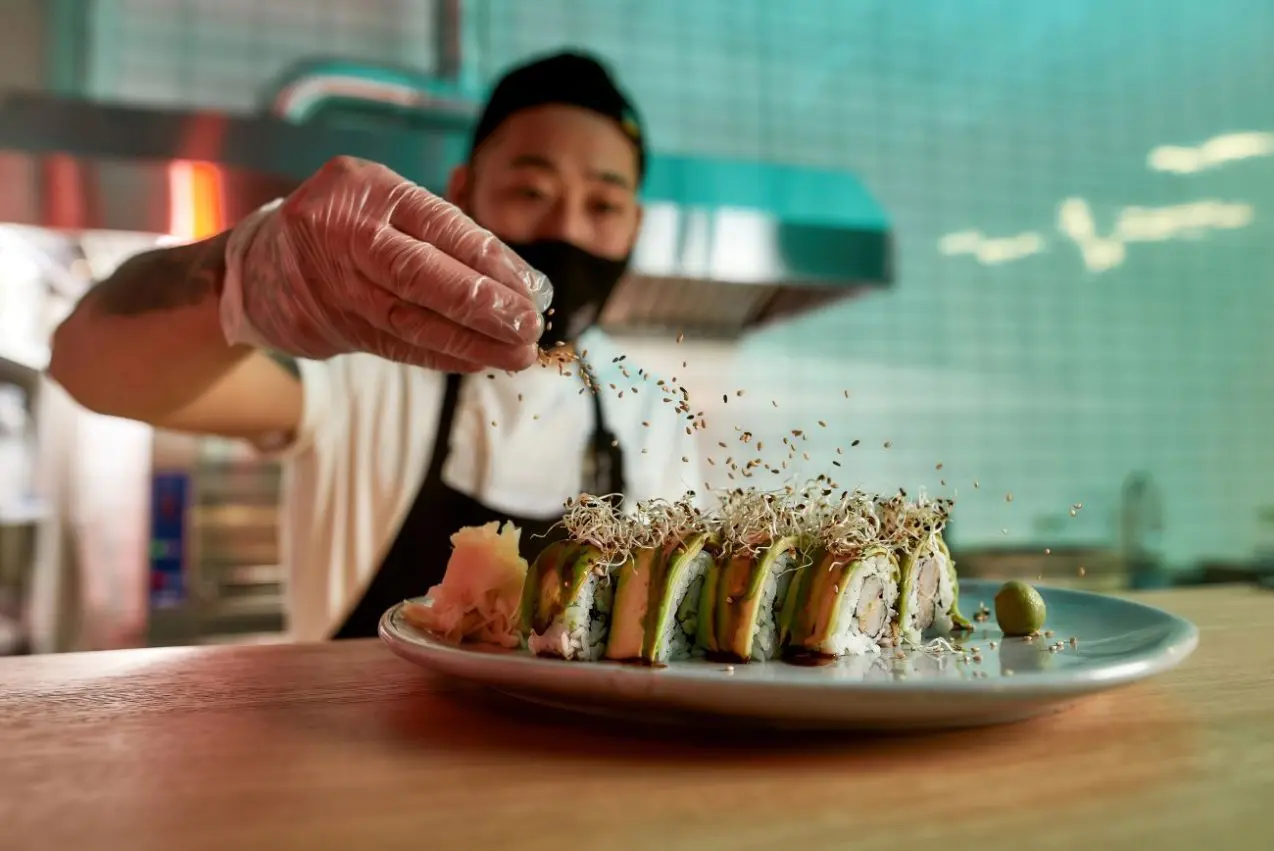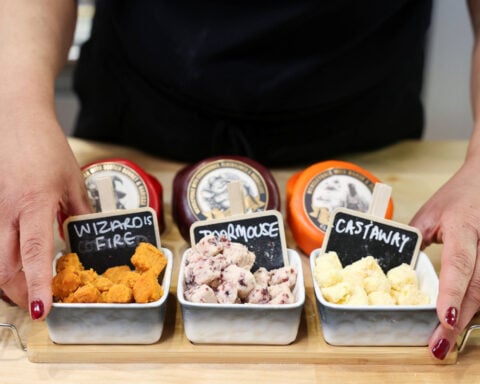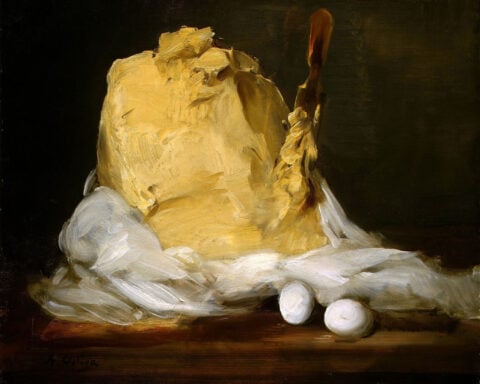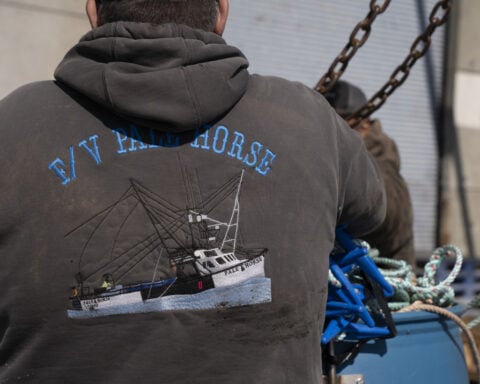It only took 50 years for sushi to go from being a strange, exotic dish to a regular part of American cuisine. The delicious Japanese cuisine is thought to have first arrived in America in the late 1960s from Kawafuku Restaurant in Little Tokyo, Los Angeles. Noritoshi Kanai, a Japanese immigrant, opened Kawafuku to serve local Japanese businesses. However, the restaurant quickly became popular with Americans. Now staples in sushi, Kanai fearlessly imported marine urchin from Santa Barbara and fatty tuna belly from fishermen on the East Coast who had tossed the cutaway.
Kawafuku ushered in the first wave of sushi's popularity in the U.S. as other spots soon opened in L.A. and invented California rolls – swapping raw seafood for cooked crab and avocado to suit American tastes. "Sushi quickly wriggled out of its immigrant status to become a novelty — the culinary accessory to a particular kind of 1980s Hollywood lifestyle," writes Times critic Tejal Rao. As famous diners like Yul Brynner boosted its reputation as glamorous fare, sushi proliferated to other cosmopolitan locales like New York by the late '80s.
L.A. has been referred to as America's "glorious sushi capital," and today, the city boasts stunning diversity from vegan sushi to "dragon roll specials so corpulent and substantially garnished that they require steak knives." High-concept spots like Sugarfish and Kazunori Hand Rolls also bring reasonably priced sushi to the masses. "We have it all," Rao declares. However, L.A.'s latest craze is a return to Edomae techniques: "the pure form of sushi focused on seasoning and handling ingredients to accentuate natural flavors." Traditionalists like Mori Onodera are even milling Japanese sushi rice daily inside his Atwater Village site.
Rao argues sushi's prominence in L.A. stems from the dining scene's high standards, health-conscious denizens, and built-in Japanese heritage. The prolific Nobu and Matsuhisa empires also seeded their brand globally after getting their start there. But the cuisine has undoubtedly cemented its place nationwide as grocery stores stock sushi and Americanized rolls incorporate cream cheese or tempura.
Sushi may frequently suffer "bastardization" stateside through deep frying or spicy embellishments, but a passion for authenticity and mastery also thrives. Revered sushi meccas like Masa or Nobu have seeded their brand globally, and exclusive omakase venues offering chef's choice menus thrive coast-to-coast today.
Though raw seafood first seemed entirely foreign, sushi has become a permanent fixture of the American palate. Let's explore the history chronologically:
Long before sushi's arrival, the average 1960s American family shunned raw cuisine for meat, potatoes, and heavy French fare. Chewing uncooked fish was "utterly perplexing," according to the Washington Post. Sushi first originated as Japanese street fare in the 8th century, with rice seasoned and topped with proteins, the critical component.
Sushi likely landed stateside when Kawafuku Restaurant brought Tokyo-style nigiri sushi to Los Angeles' Little Tokyo in 1966. Run by Noritoshi Kanai, he daringly imported scorned fatty tuna bellies and sea urchin, now sushi staples. Other spots swiftly followed, inventing California rolls to suit meek American palates.
By swapping raw fish for cooked crab and avocado in creative rolls, sushi was able to "wriggle out of its immigrant status to become a novelty," says Rao. Sushi gained traction as a fashionable Hollywood indulgence in the 70s and 80s, so sushi spread to other major cities. This first wave was powered by the California roll's creative liberties, making sushi more accessible.
The 80s and 90s saw sushi chains spread as Americans clamored for wackyTemporal "dragon rolls" with heavy cream cheese and mayo. Yet simultaneously, Nobu Matsuhisa began his fine-dining fusion revolution in L.A., incorporating global ingredients like Peruvian anticucho sauce into raved-about nigiri. As celebrities like Robert De Niro urged him to expand to N.Y.C. and beyond in the 90s, Nobu sparked today's global culinary empire.
This dichotomy symbolizes America's sushi zeitgeist: simultaneous bastardization through deep frying or kitschy ingredients alongside a blooming appreciation for Japanese mastery. We may take liberties stuffing rolls with smoked salmon and cream cheese, but pristine Japanese imports and Extensive omakase menus also thrive today.
The city nurtured prolific Japanese talents like Shunji and Tetsuya Nakao, who spun their culinary expertise into lasting restaurant institutions that have trained many future sushi chefs. L.A. also birthed the iconic California roll, which helped introduce Americans at large to loving raw fish.
So why does L.A. stand above the rest today? Rao cites Angelenos' high dining standards, health-conscious lifestyles, and the locale's inherent Japanese heritage as the ideal foundation for sushi to thrive. But she also notes an appreciation for innovation and tradition that allows playful experimentation by day, yet Edomae sushi purity by night.
While L.A. has always made room for whimsy, today's prevailing sushi trend is repeatedly stripping things down to fundamentals. Edomae represents the pure, fast-paced style of sushi served in Tokyo up until the 19th century when refrigeration altered ingredients. Edomae practitioners highlight pristine seafood and rice by avoiding heavy saucing and letting clean, natural flavors shine.
Esteemed sushi temples like Sushi Ginza Onodera rigorously source ultra-fresh fish from Tokyo's markets and suppliers, using traditional Edomae handling focused entirely on coaxing out each ingredient's essence. These extremists even mill specialty sushi rice daily and kill live seafood moments before service with the detailed ikejime cerebral spike method.
This back-to-basics movement has caught on at omakase venues statewide and beyond as Americans demonstrate an ever more discerning palate. While L.A. will likely always retain its flair for experimentation, Rao suggests the Edomae resurgence honors tradition and innovation uniquely in an Angeleno style.

 Trump has begun another trade war. Here's a timeline of how we got here
Trump has begun another trade war. Here's a timeline of how we got here
 Canada's leader laments lost friendship with US in town that sheltered stranded Americans after 9/11
Canada's leader laments lost friendship with US in town that sheltered stranded Americans after 9/11
 Chinese EV giant BYD's fourth-quarter profit leaps 73%
Chinese EV giant BYD's fourth-quarter profit leaps 73%
 You're an American in another land? Prepare to talk about the why and how of Trump 2.0
You're an American in another land? Prepare to talk about the why and how of Trump 2.0
 Chalk talk: Star power, top teams and No. 5 seeds headline the women's March Madness Sweet 16
Chalk talk: Star power, top teams and No. 5 seeds headline the women's March Madness Sweet 16
 Purdue returns to Sweet 16 with 76-62 win over McNeese in March Madness
Purdue returns to Sweet 16 with 76-62 win over McNeese in March Madness








